21 apr 2016
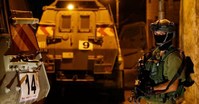
The Israeli Occupation Forces (IOF) stormed different neighborhoods east of the northern West Bank city of Nablus at dawn Thursday.
Eyewitnesses affirmed that several Israeli military vehicles stormed the city at 2 a.m. and deployed in its neighborhoods till morning hours before withdrawing from the area without reporting any arrests.
On the other hand, dozens of Israeli settlers carried out overnight provocative acts at the southern entrances to the city after gathering in large numbers at Zaatara and Hawara checkpoints.
Palestinian vehicles were forced to use alternative routes for fear of any possible settlers’ attack.
Along the same line, Israeli forces stationed at Karama crossing, which links between occupied West Bank and Jordan, prevented the travel of 63-year-old Anwar Mouna and his wife who were on their way to Saudi Arabia to perform Umrah.
After being detained for several hours, the couple was informed that they are banned from traveling via Karama crossing under alleged security pretexts. Anwar Mouna is the father of the journalist Mohamed Mouna and the engineer Fathi Mouna who were detained more than once by Israeli forces.
Eyewitnesses affirmed that several Israeli military vehicles stormed the city at 2 a.m. and deployed in its neighborhoods till morning hours before withdrawing from the area without reporting any arrests.
On the other hand, dozens of Israeli settlers carried out overnight provocative acts at the southern entrances to the city after gathering in large numbers at Zaatara and Hawara checkpoints.
Palestinian vehicles were forced to use alternative routes for fear of any possible settlers’ attack.
Along the same line, Israeli forces stationed at Karama crossing, which links between occupied West Bank and Jordan, prevented the travel of 63-year-old Anwar Mouna and his wife who were on their way to Saudi Arabia to perform Umrah.
After being detained for several hours, the couple was informed that they are banned from traveling via Karama crossing under alleged security pretexts. Anwar Mouna is the father of the journalist Mohamed Mouna and the engineer Fathi Mouna who were detained more than once by Israeli forces.
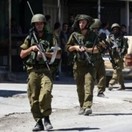
At least 16 Palestinians were injured as clashes broke out Thursday morning in Abu Dis town east of occupied Jerusalem.
The clashes erupted when heavily-armed Israeli policemen stormed at dawn today the town and carried out a search campaign in local homes and commercial shops.
Israeli police spokeswoman Luba al-Samri claimed in a statement that Israeli police and border police forces found ammunition and raw material during its raid in Abu Dis.
Two of the raided workshops were allegedly used to make explosive devices and weapons, she added. Al-Sumari declared the detention of an unidentified young man who was taken in for questioning at a police station in the illegal settlement of Maale Adumim.
Quds Press affirmed that a youth was detained when Israeli forces stormed overnight al- al-Eizariya and Abu Dis towns. Several homes were violently stormed and searched during the raid which led to the outbreak of the clashes, the sources continued. Palestinian Red Crescent said that 16 Palestinians were injured during the clashes, four of them hit by rubber-coated steel bullets while 12 others suffered tear gas suffocation.
Meanwhile, the Israeli Occupation Forces (IOF) carried out Thursday morning a large-scale raid and arrest campaign across West Bank which led to the outbreak of violent clashes. In al-Khalil, Israeli forces stormed different neighborhoods and carried out raid and search operations. Several arrests were reported during the raids.
According to the PIC reporter, two ex-prisoners’ homes were stormed and violently searched during the pre-dawn raid campaign. A young man was also arrested and taken to an unknown detention center after Israeli forces broke into his family’s house south of the city.
A second young man was summoned for investigation as Israeli soldiers stormed his house in Fawwar refugee camp in al-Khalil. In Bethlehem, IOF soldiers arrested a 16-year-old boy from Takoa town and stormed a slain Palestinian’s house in Beit Fujar town.
Another arrest was reported in Tulkarem, while violent raids and arrests were carried out in Ni’lin town in Ramallah. Similar raids were also reported in Salfit.
At Least 12 Palestinians Injured In Al-Ezariyya And Abu Dis, In Jerusalem
Israeli soldiers invaded, earlier on Thursday morning, Abu Dis and the al-‘Ezariyya towns, in occupied Jerusalem, kidnapped one Palestinian, and injured at least twelve others during ensuing clashes.
The Israeli police said it uncovered two workshops, allegedly used for manufacturing weapons and explosives, in Abu Dis town east of occupied East Jerusalem.
It added that the workshops were uncovered in a joint operation with the army and security services, and that the search uncovered two caches of weapons and mentions. The Police also hinted that it intends to demolish the two facilities at a later time.
In addition, the Palestinian Red Crescent Society (RCS) said its medics provided the needed treatment to twelve, who were injured by army fire, during clashes in Abu Dis and al-‘Ezariyya.
It said four Palestinians were shot with rubber-coated steel bullets, and eight others suffered severe effects of tear has inhalation.
The clashes erupted when heavily-armed Israeli policemen stormed at dawn today the town and carried out a search campaign in local homes and commercial shops.
Israeli police spokeswoman Luba al-Samri claimed in a statement that Israeli police and border police forces found ammunition and raw material during its raid in Abu Dis.
Two of the raided workshops were allegedly used to make explosive devices and weapons, she added. Al-Sumari declared the detention of an unidentified young man who was taken in for questioning at a police station in the illegal settlement of Maale Adumim.
Quds Press affirmed that a youth was detained when Israeli forces stormed overnight al- al-Eizariya and Abu Dis towns. Several homes were violently stormed and searched during the raid which led to the outbreak of the clashes, the sources continued. Palestinian Red Crescent said that 16 Palestinians were injured during the clashes, four of them hit by rubber-coated steel bullets while 12 others suffered tear gas suffocation.
Meanwhile, the Israeli Occupation Forces (IOF) carried out Thursday morning a large-scale raid and arrest campaign across West Bank which led to the outbreak of violent clashes. In al-Khalil, Israeli forces stormed different neighborhoods and carried out raid and search operations. Several arrests were reported during the raids.
According to the PIC reporter, two ex-prisoners’ homes were stormed and violently searched during the pre-dawn raid campaign. A young man was also arrested and taken to an unknown detention center after Israeli forces broke into his family’s house south of the city.
A second young man was summoned for investigation as Israeli soldiers stormed his house in Fawwar refugee camp in al-Khalil. In Bethlehem, IOF soldiers arrested a 16-year-old boy from Takoa town and stormed a slain Palestinian’s house in Beit Fujar town.
Another arrest was reported in Tulkarem, while violent raids and arrests were carried out in Ni’lin town in Ramallah. Similar raids were also reported in Salfit.
At Least 12 Palestinians Injured In Al-Ezariyya And Abu Dis, In Jerusalem
Israeli soldiers invaded, earlier on Thursday morning, Abu Dis and the al-‘Ezariyya towns, in occupied Jerusalem, kidnapped one Palestinian, and injured at least twelve others during ensuing clashes.
The Israeli police said it uncovered two workshops, allegedly used for manufacturing weapons and explosives, in Abu Dis town east of occupied East Jerusalem.
It added that the workshops were uncovered in a joint operation with the army and security services, and that the search uncovered two caches of weapons and mentions. The Police also hinted that it intends to demolish the two facilities at a later time.
In addition, the Palestinian Red Crescent Society (RCS) said its medics provided the needed treatment to twelve, who were injured by army fire, during clashes in Abu Dis and al-‘Ezariyya.
It said four Palestinians were shot with rubber-coated steel bullets, and eight others suffered severe effects of tear has inhalation.
20 apr 2016
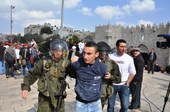
The Israeli Occupation Forces (IOF) stormed Wednesday afternoon Azzoun town south of Qalqilia which led to the outbreak of violent clashes.
Local sources told the PIC reporter that IOF closed the main entrance to Azzoun town before breaking into its neighborhoods amid heavy fire of teargas bombs.
Several local shops were also raided while passing by citizens were stopped and investigated, the sources added. Local youths responded by throwing stones and empty bottles at the soldiers who were deployed in large numbers in the town.
Also on Wednesday, Israeli policemen arrested a Palestinian young man during clashes that erupted in Katana village northwest of occupied Jerusalem.
The clashes broke out when Israeli policemen stormed the village by the end of the school day and started firing teargas bombs at the students while leaving their schools, local activists reported.
Several students choked on tear gas while nearby trees were burned due to the excessive use of teargas bombs. Local youths responded by stoning the Israeli policemen who tried to break into the secondary school in the village at the pretext of looking for students who were throwing stones but were prevented by the headmaster from entering the building.
A Palestinian young man was arrested for allegedly being involved in the clashes. More than 40 Palestinians were arrested since the early morning hours during Israeli raids across West Bank and occupied Jerusalem.
Local sources told the PIC reporter that IOF closed the main entrance to Azzoun town before breaking into its neighborhoods amid heavy fire of teargas bombs.
Several local shops were also raided while passing by citizens were stopped and investigated, the sources added. Local youths responded by throwing stones and empty bottles at the soldiers who were deployed in large numbers in the town.
Also on Wednesday, Israeli policemen arrested a Palestinian young man during clashes that erupted in Katana village northwest of occupied Jerusalem.
The clashes broke out when Israeli policemen stormed the village by the end of the school day and started firing teargas bombs at the students while leaving their schools, local activists reported.
Several students choked on tear gas while nearby trees were burned due to the excessive use of teargas bombs. Local youths responded by stoning the Israeli policemen who tried to break into the secondary school in the village at the pretext of looking for students who were throwing stones but were prevented by the headmaster from entering the building.
A Palestinian young man was arrested for allegedly being involved in the clashes. More than 40 Palestinians were arrested since the early morning hours during Israeli raids across West Bank and occupied Jerusalem.
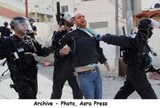
Several Israeli military vehicles invaded, on Wednesday at dawn, the Zbeidat town, in the West Bank’s Plains, in the Jordan Valley, and demolished two Palestinian homes.
Several military vehicles invaded the town, violently searched a number of homes, and kidnapped two Palestinians, identified as Eyad Mohammad Abed Zbeidat, 35, and Mohammad Omar Zbeidat, 24.
Eyewitnesses said the soldiers hurled a firebomb into Eyad’s home, causing parts of the property, including the furniture, to burn. Eyad is a supervisor at the Palestinian Education Ministry.
They added that Mohammad is a farmer, and that the soldiers violently invaded his home and searched it, before abducting him.
Several military vehicles invaded the town, violently searched a number of homes, and kidnapped two Palestinians, identified as Eyad Mohammad Abed Zbeidat, 35, and Mohammad Omar Zbeidat, 24.
Eyewitnesses said the soldiers hurled a firebomb into Eyad’s home, causing parts of the property, including the furniture, to burn. Eyad is a supervisor at the Palestinian Education Ministry.
They added that Mohammad is a farmer, and that the soldiers violently invaded his home and searched it, before abducting him.
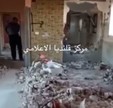
Israeli soldiers invaded, on Wednesday at dawn, Qalandia refugee camp, north of occupied Jerusalem, demolished one home and injured at least eight Palestinians, including three with live fire; one of the wounded was among the abducted residents.
The soldiers surrounded the home of Hussein Abu Ghosh, 17, forced the family out and demolished the property’s inner walls, rendering it uninhabitable.
Abu Ghosh was killed by the army, along with another Palestinian on January 26, 2016, after stabbing an Israeli settler woman to death.
The second Palestinian, who was also killed in the same incident, has been identified as Ibrahim Allan, 22. The attack took place in Beit Horon Israeli colony.
The Abu Ghosh family home is on the third floor of a four-story building inhabited by Allan’s father, and his six brothers.
The invasion into the refugee camp was carried out by more than 40 armored vehicles and a military bulldozer.
Local sources said the soldiers also kidnapped a young man, identified as Hasan Sajdiyya, after shooting and injuring him.
Medical sources said the soldiers shot three young men with live rounds, and five others with rubber-coated steel bullets, while dozens of Palestinians suffered the effects of tear gas inhalation.
Israeli military sources said two soldiers were injured during the clashes that took place in the refugee camp, after some protesters hurled a homemade explosive on an army vehicle.
The soldiers surrounded the home of Hussein Abu Ghosh, 17, forced the family out and demolished the property’s inner walls, rendering it uninhabitable.
Abu Ghosh was killed by the army, along with another Palestinian on January 26, 2016, after stabbing an Israeli settler woman to death.
The second Palestinian, who was also killed in the same incident, has been identified as Ibrahim Allan, 22. The attack took place in Beit Horon Israeli colony.
The Abu Ghosh family home is on the third floor of a four-story building inhabited by Allan’s father, and his six brothers.
The invasion into the refugee camp was carried out by more than 40 armored vehicles and a military bulldozer.
Local sources said the soldiers also kidnapped a young man, identified as Hasan Sajdiyya, after shooting and injuring him.
Medical sources said the soldiers shot three young men with live rounds, and five others with rubber-coated steel bullets, while dozens of Palestinians suffered the effects of tear gas inhalation.
Israeli military sources said two soldiers were injured during the clashes that took place in the refugee camp, after some protesters hurled a homemade explosive on an army vehicle.
19 apr 2016
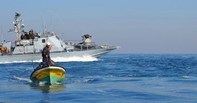
Israeli naval forces shot and injured a Palestinian fisherman and detained three others off the Gaza coast early Tuesday, the Palestinian fishermen union said.
Head of the fishermen’s union Nizar Ayyash affirmed that Israeli forces opened fire on the fishermen while sailing within the nine-mile fishing zone designated by the Israeli authorities.
The injured fisherman was taken to hospital for treatment of a rubber bullet injury, while the three others were detained and taken to Ashdod military seaport, Ayyash explained.
Israel early this month loosened severe fishing restrictions on Palestinians in the besieged coastal enclave, extending the military-enforced designated fishing zone by three additional nautical miles. Palestinian fishermen are often targeted by Israeli naval forces despite posing no threat.
Nearly 100 fishermen were arrested since the ceasefire agreement in Gaza was signed on Aug. 26, 2014. Five of them are still held by Israel.
Head of the fishermen’s union Nizar Ayyash affirmed that Israeli forces opened fire on the fishermen while sailing within the nine-mile fishing zone designated by the Israeli authorities.
The injured fisherman was taken to hospital for treatment of a rubber bullet injury, while the three others were detained and taken to Ashdod military seaport, Ayyash explained.
Israel early this month loosened severe fishing restrictions on Palestinians in the besieged coastal enclave, extending the military-enforced designated fishing zone by three additional nautical miles. Palestinian fishermen are often targeted by Israeli naval forces despite posing no threat.
Nearly 100 fishermen were arrested since the ceasefire agreement in Gaza was signed on Aug. 26, 2014. Five of them are still held by Israel.
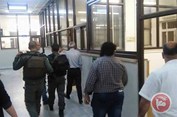
Israeli police searched the main offices of Jerusalem-based Palestinian news outlet al-Quds late Monday, holding employees at gunpoint and harassing workers during the search, local sources said.
Sources told Ma’an that Israeli police raided the newspaper's’ main building and print shop in the Atarot industrial area in northern Jerusalem before checking surveillance cameras, in a search for West Bank IDs-holders who had allegedly entered Israel illegally.
Al-Quds newspapers’ employees denied that anyone was present in the building who had entered the area illegally, sources said.
Witnesses said that two Israeli officers pulled guns on al-Quds employees during the raid, shouting obscenities at journalists in the office.
An Israeli police spokesperson had no information on the search.
Palestinian media outlets have been frequently targeted by the Israeli authorities since unrest hit the occupied Palestinian territory over the past six months, with a number of outlets shut down for alleged “incitement against Israel.”
Following Israel’s raid and closure of a slew of news offices late last year, a high-ranking PA official said the move was part of Israel’s policy to "oppress the voice of Palestinian rights.”
Sources told Ma’an that Israeli police raided the newspaper's’ main building and print shop in the Atarot industrial area in northern Jerusalem before checking surveillance cameras, in a search for West Bank IDs-holders who had allegedly entered Israel illegally.
Al-Quds newspapers’ employees denied that anyone was present in the building who had entered the area illegally, sources said.
Witnesses said that two Israeli officers pulled guns on al-Quds employees during the raid, shouting obscenities at journalists in the office.
An Israeli police spokesperson had no information on the search.
Palestinian media outlets have been frequently targeted by the Israeli authorities since unrest hit the occupied Palestinian territory over the past six months, with a number of outlets shut down for alleged “incitement against Israel.”
Following Israel’s raid and closure of a slew of news offices late last year, a high-ranking PA official said the move was part of Israel’s policy to "oppress the voice of Palestinian rights.”
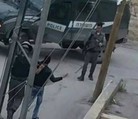
Israeli soldiers shot and injured, on Monday evening, a Palestinian child, in the al-Ram town, northeast of Jerusalem, and also kidnapped a young man from his home in the town.
The Red Crescent said the soldiers shot a child, 15 years of age, and prevented its medics from approaching him,.
The soldiers then assaulted the wounded wounded child, and took him to an unknown destination.
The extent of the child’s injuries remains unknown, as the Palestinian medics were not even allowed to get close to him. Initial reports indicate he was shot in his thigh.
The soldiers also assaulted a young man, while standing at the door of his home, and kidnapped him.
The Red Crescent said the soldiers shot a child, 15 years of age, and prevented its medics from approaching him,.
The soldiers then assaulted the wounded wounded child, and took him to an unknown destination.
The extent of the child’s injuries remains unknown, as the Palestinian medics were not even allowed to get close to him. Initial reports indicate he was shot in his thigh.
The soldiers also assaulted a young man, while standing at the door of his home, and kidnapped him.
18 apr 2016
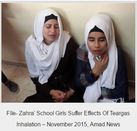
Palestinian medical sources in Hebron, in the southern part of the occupied West Bank, has reported Monday that at least eleven children suffered the effects of tear gas inhalation, after Israeli soldiers fired gas bombs on them.
The sources said Red Crescent medics provided eleven students of the Zahra’ Elementary School for Girls with the needed first aid after they suffered severe effects of tear gas inhalation.
The children were walking to school, close to the Abu ar-Reesh Israeli military roadblock, in the southern part of Hebron city, when the soldiers fired many gas bombs on them, after preventing them from crossing while on their way to school.
The Palestinians in Hebron face one of the most difficult conditions in the occupied West Bank as the soldiers blockade entire roads and neighborhoods, not just with military roadblocks, but with iron gates, metal detectors and concrete blocks, especially in areas were illegal Israeli colonists reside.
There are four Israeli colonies in downtown Hebron alone, with approximately 500 inhabitants. Around 7000 additional colonizers live in Keryat Arab’ colony, in the outskirts of Hebron city.
Many other settlements, including Givat Ha’avot, Givat Hasrina, east of Hebron, and Beit Haggai colony, south of the city, surround Hebron.
The sources said Red Crescent medics provided eleven students of the Zahra’ Elementary School for Girls with the needed first aid after they suffered severe effects of tear gas inhalation.
The children were walking to school, close to the Abu ar-Reesh Israeli military roadblock, in the southern part of Hebron city, when the soldiers fired many gas bombs on them, after preventing them from crossing while on their way to school.
The Palestinians in Hebron face one of the most difficult conditions in the occupied West Bank as the soldiers blockade entire roads and neighborhoods, not just with military roadblocks, but with iron gates, metal detectors and concrete blocks, especially in areas were illegal Israeli colonists reside.
There are four Israeli colonies in downtown Hebron alone, with approximately 500 inhabitants. Around 7000 additional colonizers live in Keryat Arab’ colony, in the outskirts of Hebron city.
Many other settlements, including Givat Ha’avot, Givat Hasrina, east of Hebron, and Beit Haggai colony, south of the city, surround Hebron.
17 apr 2016
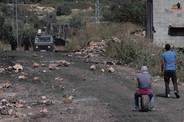
On 15th April, weekly demonstrations against the Israeli occupation were held throughout the occupied West Bank commemorating ‘Prisoner’s Day’.
Kafr Qaddum village has been separated from their main access road to the Palestinian city of Nablus for 13 years. They hold weekly demonstrations against the closure of this road, which was initially closed in order to allow free movement for settlers from the nearby illegal Qedumim settlement.
This Friday Israeli forces inundated the demonstrators and part of the village with tear gas, resulting in dozens of people receiving emergency medical treatment for excessive tear gas inhalation. In an all too common act of collective punishment, Israeli forces did not only target the demonstrators with tear gas and rubber coated metal bullets, but also sprayed civilian homes in the village with foul smelling ‘skunk water’.
Early in the morning, before the start of the demonstration, Israeli forces closed the village entrance, arbitrarily (and illegally) declaring it a ‘closed military zone’ in order to prevent international and Israeli activists from participating in the demonstration.
In the village of Nabi Saleh, villagers, international solidarity activists and journalists demonstrating the Israeli occupation and theft of land, were attacked not only by the Israeli forces, but additionally by settlers from the illegal settlement of Halamish. Israeli forces inundated the protest with tear gas, causing several cases of excessive tear gas inhalation.
Israeli forces at the Ofer military prison complex fired stun grenades, tear gas, rubber coated metal bullets as well as live fire at unarmed protestors. They arrested four protestors and, in an act of collective punishment, entered the village of Beitunia arbitrarily shooting tear gas into the streets causing civilians to suffer from excessive tear gas inhalation.
Palestinians and supporters world-wide commemorate Prisoner Day on 17th April each year, in solidarity with Palestinian political prisoners in Israeli jails. There are at least 7000 Palestinian prisoners in Israeli jails, 750 of whom are held under ‘administrative detention’ without charge or trial. This includes 1400 minors under the age of 18 since October 2015. Under Israeli military law – which is effect throughout the West Bank – Palestinian children as young as 12 years old can be arrested by Israeli forces. In many of these cases the children are denied access to family, lawyers and their most basic human rights. They are often interrogated, intimidated and physically and psychologically threatened without a family member or lawyer present. As a result these children can be forced to sign confessions in Hebrew, a language they do not understand.
Most Palestinian prisoners are transferred to prisons within the Israeli territories. This act is illegal under international law that prohibits the transfer of prisoners from the occupied Palestinian territories into an area where they can only receive family visits after applying and receiving permission from the Israeli government. This is a permission, of course, that is very rarely granted.
Kafr Qaddum village has been separated from their main access road to the Palestinian city of Nablus for 13 years. They hold weekly demonstrations against the closure of this road, which was initially closed in order to allow free movement for settlers from the nearby illegal Qedumim settlement.
This Friday Israeli forces inundated the demonstrators and part of the village with tear gas, resulting in dozens of people receiving emergency medical treatment for excessive tear gas inhalation. In an all too common act of collective punishment, Israeli forces did not only target the demonstrators with tear gas and rubber coated metal bullets, but also sprayed civilian homes in the village with foul smelling ‘skunk water’.
Early in the morning, before the start of the demonstration, Israeli forces closed the village entrance, arbitrarily (and illegally) declaring it a ‘closed military zone’ in order to prevent international and Israeli activists from participating in the demonstration.
In the village of Nabi Saleh, villagers, international solidarity activists and journalists demonstrating the Israeli occupation and theft of land, were attacked not only by the Israeli forces, but additionally by settlers from the illegal settlement of Halamish. Israeli forces inundated the protest with tear gas, causing several cases of excessive tear gas inhalation.
Israeli forces at the Ofer military prison complex fired stun grenades, tear gas, rubber coated metal bullets as well as live fire at unarmed protestors. They arrested four protestors and, in an act of collective punishment, entered the village of Beitunia arbitrarily shooting tear gas into the streets causing civilians to suffer from excessive tear gas inhalation.
Palestinians and supporters world-wide commemorate Prisoner Day on 17th April each year, in solidarity with Palestinian political prisoners in Israeli jails. There are at least 7000 Palestinian prisoners in Israeli jails, 750 of whom are held under ‘administrative detention’ without charge or trial. This includes 1400 minors under the age of 18 since October 2015. Under Israeli military law – which is effect throughout the West Bank – Palestinian children as young as 12 years old can be arrested by Israeli forces. In many of these cases the children are denied access to family, lawyers and their most basic human rights. They are often interrogated, intimidated and physically and psychologically threatened without a family member or lawyer present. As a result these children can be forced to sign confessions in Hebrew, a language they do not understand.
Most Palestinian prisoners are transferred to prisons within the Israeli territories. This act is illegal under international law that prohibits the transfer of prisoners from the occupied Palestinian territories into an area where they can only receive family visits after applying and receiving permission from the Israeli government. This is a permission, of course, that is very rarely granted.
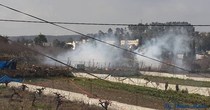
Violent clashes broke out Sunday morning at the entrance to Aroub refugee camp north of al-Khalil for the second consecutive day.
Local sources said that Palestinian youths threw stones and empty bottles at Israeli military vehicles stationed at the bypass road No. 60 linking between Beit Ummar town and Etzion roundabout.
Israeli forces, for their part, heavily and randomly fired tear gas bombs and stun grenades at the local youths.
Earlier Saturday, violent confrontations broke out in Aroub refugee camp north of al-Khalil during the funeral of the slain Palestinian Ibrahim Baradiya who was shot and killed by Israeli gunfire Thursday. The clashes lasted till late hours yesterday.
Local sources said that Palestinian youths threw stones and empty bottles at Israeli military vehicles stationed at the bypass road No. 60 linking between Beit Ummar town and Etzion roundabout.
Israeli forces, for their part, heavily and randomly fired tear gas bombs and stun grenades at the local youths.
Earlier Saturday, violent confrontations broke out in Aroub refugee camp north of al-Khalil during the funeral of the slain Palestinian Ibrahim Baradiya who was shot and killed by Israeli gunfire Thursday. The clashes lasted till late hours yesterday.
16 apr 2016
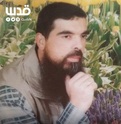
Palestinian residents of al-Arroub refugee camp in the southern occupied West Bank district of Hebron attended a funeral Saturday for Ibrahim Baradiya, 54, who was killed by Israeli forces on Thursday after he allegedly attempted to carry out an ax attack near the camp entrance.
Baradiya’s body was transported to the refugee camp via a back road rather than the main road, out of fear that the Israeli authorities might try to take back the body after it was announced it had been delivered to the family “by mistake."
Palestinian military liaisons received the body on Friday, and it was then taken to al-Ahli hospital in Hebron.
During the funeral march, mourners called upon the international community to end Israeli violations against Palestinian rights.
Clashes broke out between Palestinian youths and Israeli military forces following the funeral.
Baradiya was among more than 200 Palestinians to be killed since a wave of unrest swept the occupied Palestinian territory in October. His killing marked the first after two consecutive weeks without deaths in the context of attacks or clashes -- the longest period without deaths since the escalation of violence.
Baradiya's death marked one of at least three residents to be killed by Israeli forces in al-Arroub refugee camp since October. Two other residents -- both teenagers -- were shot dead on separate occasions when clashes broke out during military raids on the camp.
The majority of Palestinians have been killed while allegedly carrying out or atempting to carry out small-scale attacks that have left nearly 30 Israelis dead, while nearly 50 have been shot dead during clashes with the military.
Several Palestinians that have been killed were shot dead under circumstances that rights groups and the international community have labelled extrajudicial executions carried out by Israeli forces.
Baradiya’s body was transported to the refugee camp via a back road rather than the main road, out of fear that the Israeli authorities might try to take back the body after it was announced it had been delivered to the family “by mistake."
Palestinian military liaisons received the body on Friday, and it was then taken to al-Ahli hospital in Hebron.
During the funeral march, mourners called upon the international community to end Israeli violations against Palestinian rights.
Clashes broke out between Palestinian youths and Israeli military forces following the funeral.
Baradiya was among more than 200 Palestinians to be killed since a wave of unrest swept the occupied Palestinian territory in October. His killing marked the first after two consecutive weeks without deaths in the context of attacks or clashes -- the longest period without deaths since the escalation of violence.
Baradiya's death marked one of at least three residents to be killed by Israeli forces in al-Arroub refugee camp since October. Two other residents -- both teenagers -- were shot dead on separate occasions when clashes broke out during military raids on the camp.
The majority of Palestinians have been killed while allegedly carrying out or atempting to carry out small-scale attacks that have left nearly 30 Israelis dead, while nearly 50 have been shot dead during clashes with the military.
Several Palestinians that have been killed were shot dead under circumstances that rights groups and the international community have labelled extrajudicial executions carried out by Israeli forces.
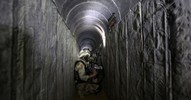
The Israeli occupation army on Saturday started anew its digging activities along the eastern borderline of the Gaza Strip to search for underground tunnels.
According to Quds Press, seven big excavators were used in the search operation, which started on the eastern border of Rafah area, south of Gaza.
During the operation, Israeli soldiers opened fire at Palestinian citizens and farmers in different border areas, especially east of Gaza City.
The border tunnels, which were built by al-Qassam Brigades of Hamas, played an important role in launching abrupt counterattacks on Israeli military targets during the 2014 war.
According to Quds Press, seven big excavators were used in the search operation, which started on the eastern border of Rafah area, south of Gaza.
During the operation, Israeli soldiers opened fire at Palestinian citizens and farmers in different border areas, especially east of Gaza City.
The border tunnels, which were built by al-Qassam Brigades of Hamas, played an important role in launching abrupt counterattacks on Israeli military targets during the 2014 war.
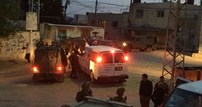
The Israeli Occupation Forces (IOF) stormed at dawn Saturday Iraq Burin town south of Nablus without carrying out any arrests.
Eyewitnesses affirmed that a number of Israeli military vehicles stormed the town at 4 a.m. and then pulled out from the area after half an hour.
No arrests or raids were reported, the sources added.
Several weeks ago, the town had witnessed large-scale raid and arrest campaigns following a shooting attack at a group of soldiers at a nearby checkpoint.
Eyewitnesses affirmed that a number of Israeli military vehicles stormed the town at 4 a.m. and then pulled out from the area after half an hour.
No arrests or raids were reported, the sources added.
Several weeks ago, the town had witnessed large-scale raid and arrest campaigns following a shooting attack at a group of soldiers at a nearby checkpoint.
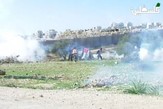
Medical sources have reported, Friday, that three Palestinians were injured, and dozens suffered the effects of tear gas inhalation, after Israeli soldiers invaded Silwad town, east of the central West Bank city of Ramallah.
The sources said three residents were shot with rubber-coated steel bullets, and dozens suffered severe effects of tear gas inhalation, in the Shuhada Street, east of the city, after the soldiers invaded it.
Dozens of soldiers first surrounded the town before invading it, and fired many gas bombs, concussion grenades and rubber-coated metal bullets.
The Israeli gas bombs also caused many Palestinians, including children, to suffer the effects of tear gas inhalation after the soldiers fired several gas bombs at homes in the town.
The sources said three residents were shot with rubber-coated steel bullets, and dozens suffered severe effects of tear gas inhalation, in the Shuhada Street, east of the city, after the soldiers invaded it.
Dozens of soldiers first surrounded the town before invading it, and fired many gas bombs, concussion grenades and rubber-coated metal bullets.
The Israeli gas bombs also caused many Palestinians, including children, to suffer the effects of tear gas inhalation after the soldiers fired several gas bombs at homes in the town.
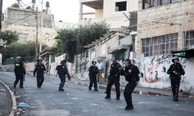
Israeli soldiers kidnapped, Friday, five Palestinians during various military invasions and attacks in different neighborhoods, in occupied Jerusalem, in addition to firing gas bombs and rubber-coated steel bullets, causing many injuries.
The Wadi Hilweh Information Center in Silwan (Silwanic), in Jerusalem, said the soldiers invaded Bab Hatta neighborhood, in the Old City, searched homes and kidnapped two Palestinians.
The two kidnapped Palestinians, Gheith Abu Haidar and Mohammad Sharifa, were severely beaten by the soldiers before being the soldiers took them to an interrogation center in Jerusalem.
Silwanic added that the soldiers invaded the al-‘Eesawiyya town, in Jerusalem, and kidnapped three Palestinians, one of them has been identified as Samir ‘Obeid.
Mohammad Abu al-Hummus, member of the Follow-Up Committee in al-‘Eesawiyya, said the soldiers fired many rubber-coated steel bullets, and gas bombs, causing many Palestinians, including an elderly woman in her own home, to suffer severe effects of tear gas inhalation.
The Wadi Hilweh Information Center in Silwan (Silwanic), in Jerusalem, said the soldiers invaded Bab Hatta neighborhood, in the Old City, searched homes and kidnapped two Palestinians.
The two kidnapped Palestinians, Gheith Abu Haidar and Mohammad Sharifa, were severely beaten by the soldiers before being the soldiers took them to an interrogation center in Jerusalem.
Silwanic added that the soldiers invaded the al-‘Eesawiyya town, in Jerusalem, and kidnapped three Palestinians, one of them has been identified as Samir ‘Obeid.
Mohammad Abu al-Hummus, member of the Follow-Up Committee in al-‘Eesawiyya, said the soldiers fired many rubber-coated steel bullets, and gas bombs, causing many Palestinians, including an elderly woman in her own home, to suffer severe effects of tear gas inhalation.
